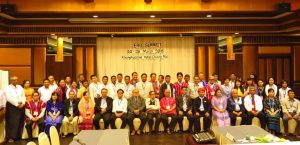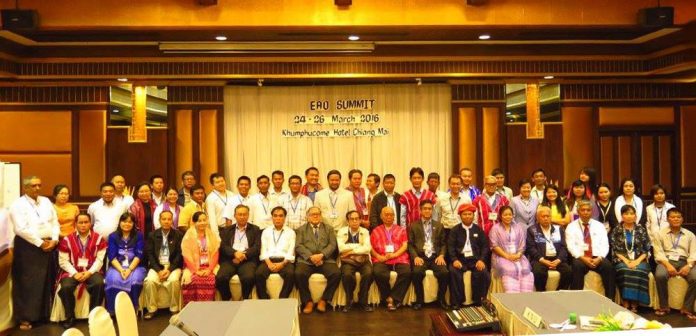Eight ethnic armed groups that signed last year’s nationwide ceasefire agreement (NCA) have pledged to work towards participation in the peace process for their non-signatory counterparts, according to a statement released this week.
The statement, issued after the signatories’ meeting of around 40 representatives in Chiang Mai, Thailand, acknowledges that all groups share common goals and commits to finding ways for those that did not sign the NCA to be meaningfully included in the ongoing peace process.

“The agenda covered how to achieve equal, fundamental gains in federal policy for all. Since policy aims toward building the union through a federal system are already in the NCA, we will find a way. Our representatives who will present at the meeting in Mai Ja Yang now have a federal policy draft to discuss at the meeting,” said Col. Khun Okkar of the Pa-O National Liberation Organization, one of the eight signatory groups represented at the Chiang Mai meeting held from July 18-20.
Ethnic armed groups, regardless of signatory status, have also planned a summit in Kachin State’s Mai Ja Yang, a northern mountain town in territory administered by the Kachin Independence Organization. The event will serve as a precursor to the 21st Century Panglong Conference, the government’s next union-level peace conference slated for late August, and participants will seek to identify common ground on political dialogue framework topics like federalism, state constitutions, and security strategy.
The statement also asserted that the NCA is seen as a first step toward resolving conflicts politically, not militarily, and that signatories believe next month’s conference can usher in the key objectives of all 21 ethnic resistance groups: national reconciliation, peace, and a democratic federal union. Signatories said they would cooperate in political talks with ethnic group alliances, political parties, the government and the Tatmadaw, or national armed forces, to achieve peaceful solutions.
Army Spokesperson and Chief of Military Security Affairs Lt. Gen. Mya Tun Oo described the military’s approach to the upcoming peace event at a press conference held at the Rangoon Military Headquarters on July 20.
“If I had to summarize, we believe that it will be a true union peace conference as the 21st Century Panglong Conference is based on the NCA [provisions]. But to implement this conference, we must do it successfully. Here, I would like to confirm that we, the Tatmadaw, will cooperate with everyone and implement the activities as best we can. This is the perspective of the Tatmadaw.”
The Lieutenant General added that the Tatmadaw does not oppose the ethnic resistance groups’ summit in Mai Ja Yang, scheduled for July 26-29, and poses no threat to security.
The eight ethnic armed groups that signed the NCA with the Thein Sein government in October 2015 are the Karen National Union, Democratic Karen Benevolent Buddhist Army (DKBA), KNU/KNLA-Peace Center (KNU/KNLA-PC), Pa-O National Liberation Organization (PNLO), Chin National Front (CNF), All Burma’s Students Democratic Front (ABSDF), Restoration Council of Shan State (RCSS) and the Arakan Liberation Party (ALP).

